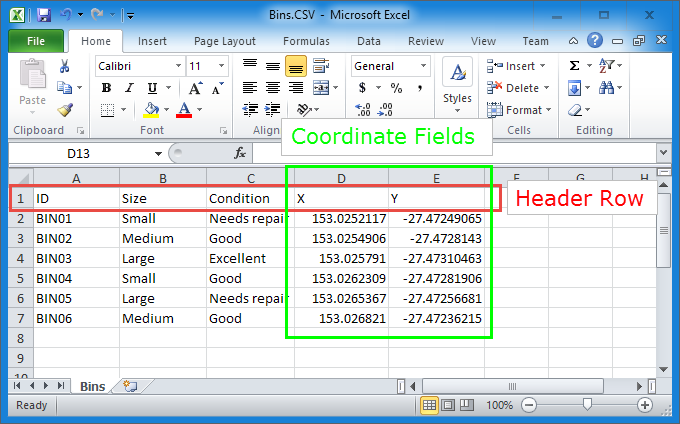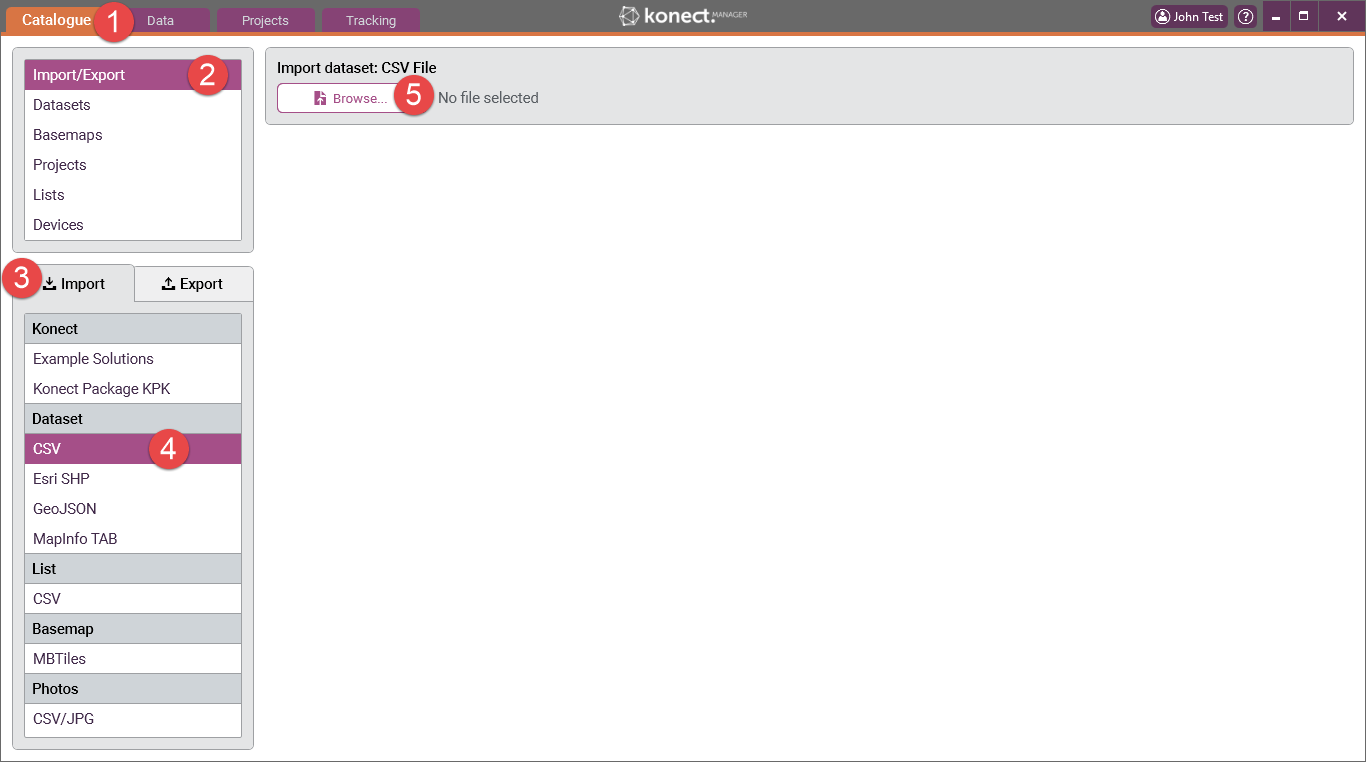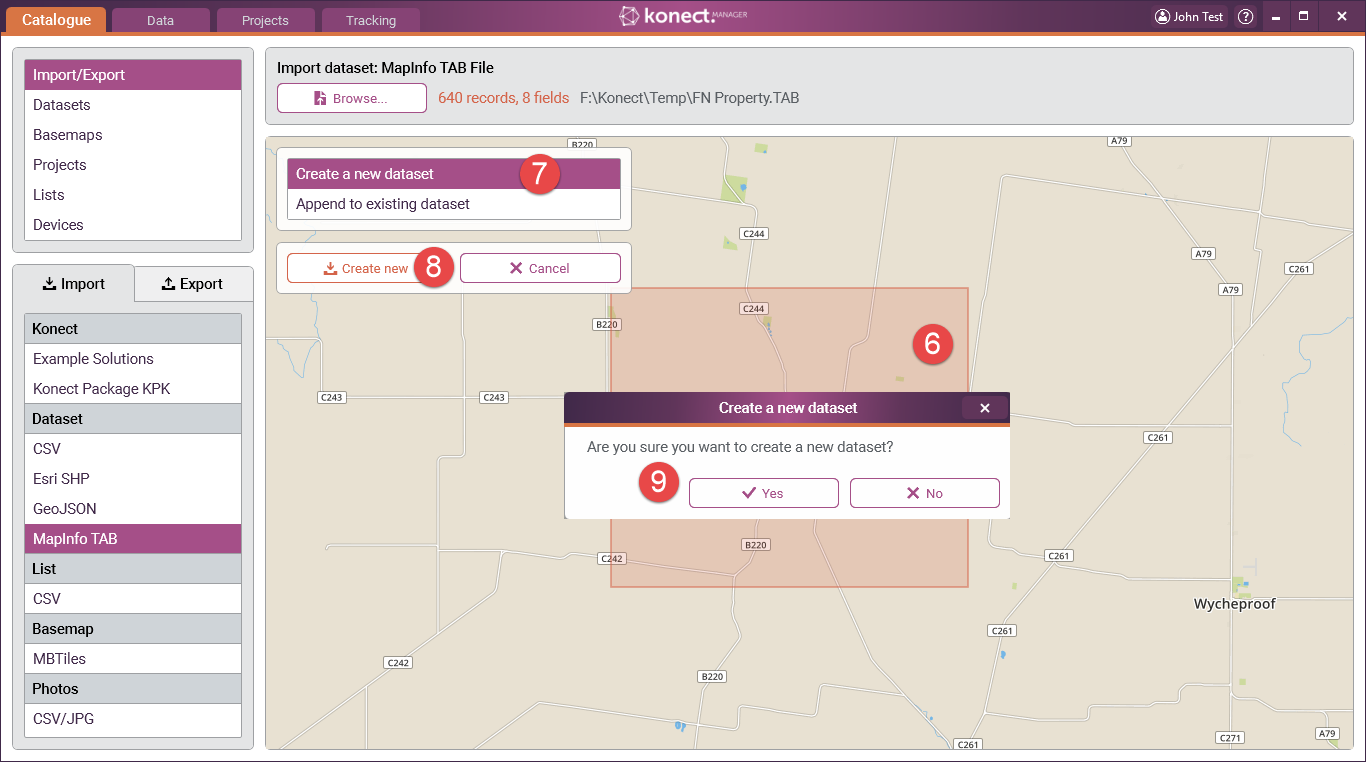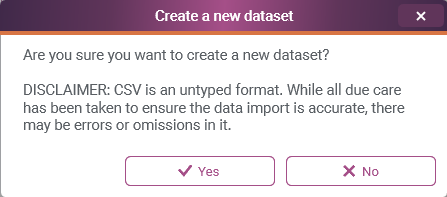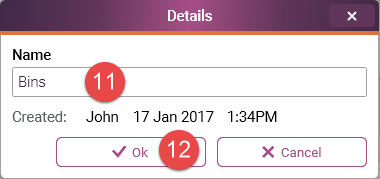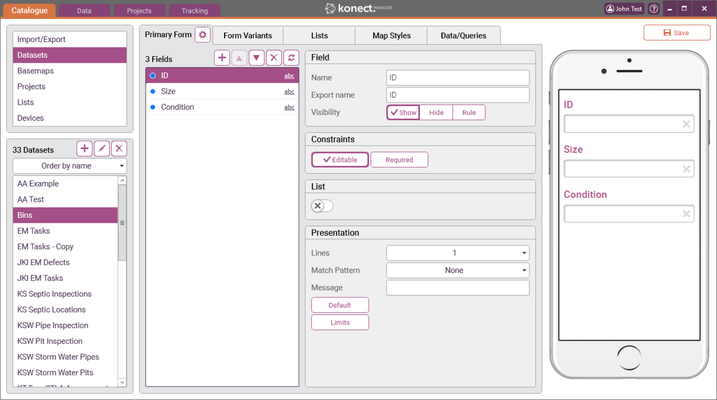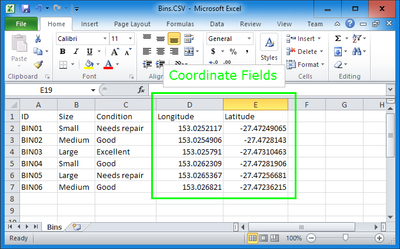Importing CSV Files - Create a New Dataset
AFFECTS
Konect Manager
ISSUE
You want to import existing data in CSV format for use in Konect and create a new dataset.
STEP-BY-STEP
CSV Structure
These instructions assume that you understand what a CSV file is and how the display of a CSV file will vary depending on the application you use to view it. See: Importing Data
For this discussion we will be using MS Excel to view and discuss the structure of CSV files.
Konect will recognise a CSV file as a capable of being imported and mapped if three requirements are met:
1. It must have a header row
2. It must have coordinate fields
3. The coordinates must be recorded as Latitude and Longitude (WGS 84 projection) but the field names can be whatever you like
If the two coordinate columns have the names ‘X’ and ‘Y’, then Konect will recognise these as coordinate fields and commence the import process. However, if the coordinate columns are not called ‘X’ and ‘Y’, then Konect prompts the user to select which columns contain the longitude and latitude.
Creating A New Dataset
Use the following steps to create a new dataset by importing a CSV file:
1 Go to the ‘Catalogue’ tab in Konect Manager.
2 Select ‘Import/Export’
3 Select the ‘Import’ tab.
4 Select ‘CSV' in the ‘Dataset’ list. NOTE: The CSV file must not be open in any other application for the import to proceed
5 Press the ‘Browse’ button. Select and 'Open' the required file. In this example ‘Bins.csv' has been used.
Where the CSV File HAS "X" and "Y" Coordinate Fields
6 If the CSV file has fields with the names "X" and "Y" and these fields contain valid longitude and latitude values respectively, Konect Manager reads the contents of the selected file and displays the number of records and the number of data fields in the file. It also draws a rectangle, called the bounding rectangle, that geographically encompasses all the map features in the file. The user can use this information to check that the correct data is being imported.
Konect performs a comparison between the dataset being imported and all existing datasets in Konect. If the data structure matches in any way you will be presented with the option of either 'Creating a new dataset' or 'Appending to an existing dataset'.
If there is no match then you are only given the option of 'Creating a new dataset'
7 If required, select 'Create a new dataset' from the options box
8 Select 'Create new'
9 Click 'Yes' when prompted to create the dataset
10 A confirmation dialog will present. The warning information relates to potential difficulty that Konect may have in interpreting some data formats, in particular date and boolean (logical) data. Click 'Yes'.
11 Enter the name that you want to give to the dataset. In this example "Bins".
12 Press the 'Ok' button.
13 The CSV file is imported and Konect Manager automatically goes to the ‘Datasets’ item in the ‘Catalogue’ from where various data settings can be set, added or modified.
Where the CSV File DOES NOT HAVE "X" and "Y" Coordinate Fields
6 If the CSV file does not have fields called "X" and "Y", Konect will prompt you to select the fields to be used. Any suitable numeric field will be available for selection from the pick lists. In this example there are only two possible choices and these just happened to be named "Latitude" and "Longitude" to make it easier to select the correct field.
Select the fields for Longitude and Latitude
Click 'Ok'
Konect Manager reads the contents of the selected file and displays the number of records and the number of data fields in the file. It also draws a rectangle, called the bounding rectangle, that geographically encompasses all the map features in the file. The user can use this information to check that the correct data is being imported.
Konect performs a comparison between the dataset being imported and all existing datasets in Konect. If the data structure matches in any way you will be presented with the option of either 'Creating a new dataset' or 'Appending to an existing dataset'.
If there is no match then you are only given the option of 'Creating a new dataset'
7 If required, select 'Create a new dataset' from the options box
8 Select 'Create new'
9 Click 'Yes' when prompted to create the dataset
10 A confirmation dialog will present. The warning information relates to potential difficulty that Konect may have in interpreting some data formats, in particular date and boolean (logical) data. Click 'Yes'.
11 Enter the name that you want to give to the dataset. In this example "Bins".
12 Press the 'Ok' button.
13 The CSV file is imported and Konect Manager automatically goes to the ‘Datasets’ item in the ‘Catalogue’ from where various data settings can be set, added or modified.
